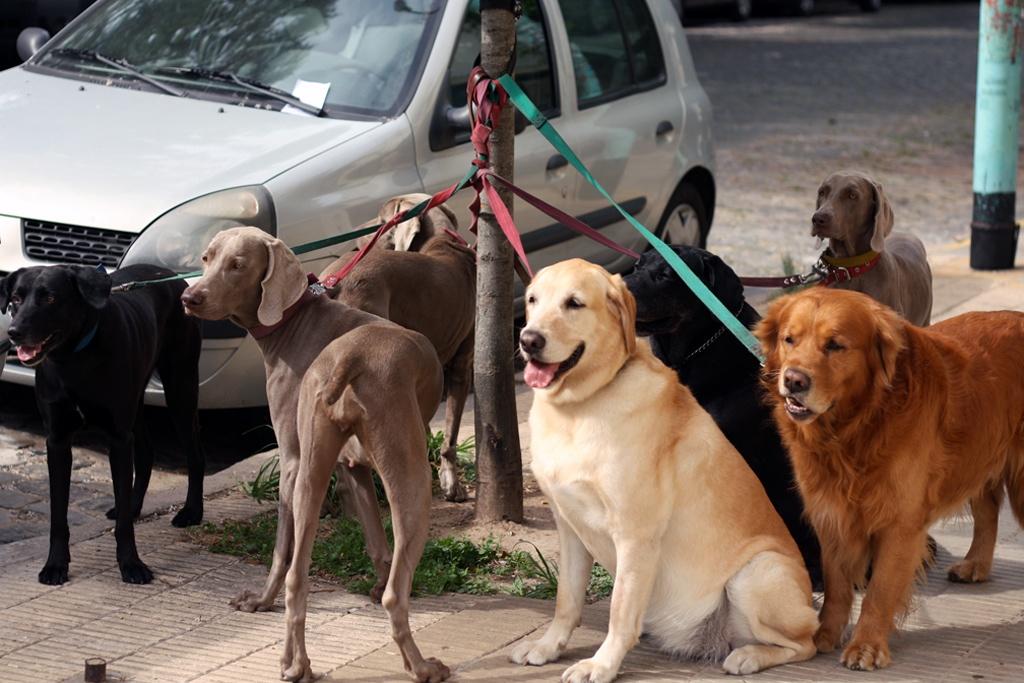Argentina, the new doggie heaven
A few of Argentina’s beloved family members, ready for a stroll.
BUENOS AIRES, Argentina — A black lab pops up from behind a bench, nipping the ear of the golden retriever sitting on the other side. The dog-walker, a dozen leashes wrapped around his wrist, playfully shoves the lab aside.
Every weekday, these paseadores maneuver through the streets of Buenos Aires with as many as 25 dogs at one time.
It’s dog-walking to an extreme.
Romulo Perrega, 22, has been walking dogs for eight years now. He does it to make money for school — he wants to be a veterinarian — but some dog-walkers do this for a living.
With 15 to 25 dogs at a time, five days a week, there’s money to be made.
As Latin America gets wealthier, it’s spending more and more on pet care. The market has doubled in the last five years to $8.3 billion in 2010, making it the “star” of the global pet-care industry, said Marcela Meirone Luchsinger of Euromonitor International.
Read more: Brazil's slowdown hurts its neighbor
“Pets are the new kids,” Meirone said. Across Latin America — led by Brazil, Mexico and Argentina — pet owners are splurging on packaged pet food, dietary supplements, grooming supplies and other trinkets.
And much of that spending goes toward man’s canine friends. Dog food outsells cat food by nearly six to one in Latin America, according to the Economist, unlike in Europe where the dog- and cat-food markets are equal.
As disposable incomes have risen among the middle class, so has pet-care spending, said Meirone. Traditionally, Argentines fed their dogs a lot of home-cooked foods. But increasingly, they’re swapping out the table scraps and purchasing packaged food from pet stores.
Many apartments in Buenos Aires allow pets, making it easy for Argentines to keep dogs. And many people appreciate the security of having a dog in the house, said Perrega.
Read more: Argentina's president
“Pets are great company,” said Liliana Anceri, who runs Bien Fifi Pet Boutique in Buenos Aires. “People with pets care for them, they see them as part of the family and they love them.”
Bien Fifi sells clothing for cats and dogs, including soccer jerseys for the two most popular local teams. It also has jeweled collars for owners who want to “adorn” their furry friends and seat belts for strapping in on car trips.
Anceri, who has a black lab, says the store is the only “pet boutique” in the Palermo neighborhood of Buenos Aires, but there are many more basic pet-care stores nearby.
Seventy-eight percent of Argentines have pets, more than any other country in Latin America, according to a study done by Millward Brown Argentina for Mars, the maker of Royal Canin, Pedigree and Whiskas pet food.
Poodles and Labradors top the list of most popular dog breeds, followed by German shepherds. But about half of Argentine dogs are mutts, and 16 percent of dog owners said they had adopted stray dogs.
In a nod to the animals’ growing popularity, President Cristina Fernandez de Kirchner signed a decree earlier this year to promote annual rabies vaccinations and de-worming for cats and dogs.
At the signing of the decree, Kirchner said she “dies of love” for her three dogs, a boxer Martita, a mini toy poodle Cleo and a pug Vito.
The decree also provides for free sterilization surgeries to encourage Argentines to have their pets spayed and neutered. But many Argentines are uncomfortable with the practice, and only 14 percent of owners said they had neutered their pets in the study by Millward Brown.
For now, the city government of Buenos Aires has a more putrid problem on its hands: dog poop all over the sidewalks.
The government estimates that dogs leave 35,000 kilograms of poop on sidewalks per day, according to Clarin. Although there is a law on the books allowing owners to be fined up to 240 pesos ($57) for not picking up after their pets, the fine is rarely enforced.
It’s often impractical for the city to collect the small fines. Though some dog owners carry a plastic bag to pick up after their pets, they’re a small minority.
But should the government ever succeed in convincing Argentines to clean up after their pets, it might just prove to be more good news for the pet care industry. After all, there’s a whole line of products designed to help scoop up poop.
Follow Stephanie on Twitter @stephaniegarlow
Our coverage reaches millions each week, but only a small fraction of listeners contribute to sustain our program. We still need 224 more people to donate $100 or $10/monthly to unlock our $67,000 match. Will you help us get there today?
